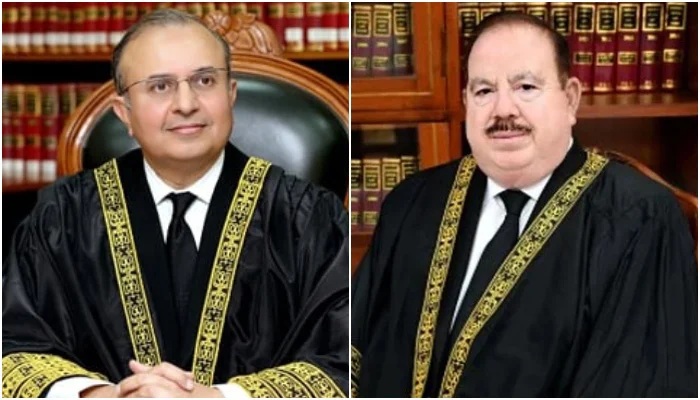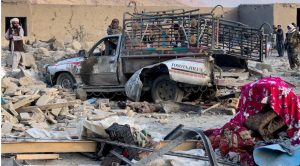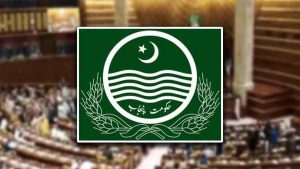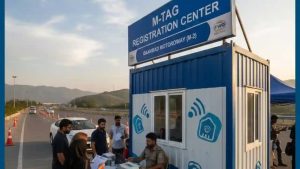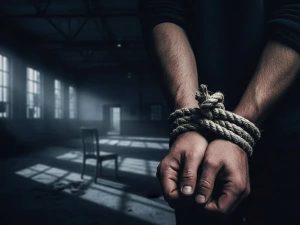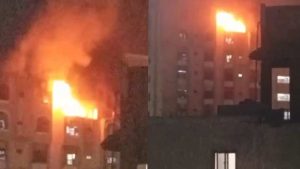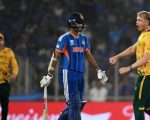ISLAMABAD – Two judges of the Supreme Court, who were part of the initial bench formed to hear petitions against trial of civilians in military courts, have expressed their reservations, saying the constitutionality of the Supreme Court (Practice and Procedure) Act 2023 should be decided first.
Justice Sardar Tariq Masood and Justice Mansoor Ali Shah issued their separate notes late Tuesday with former stating that he had not recused himself from the larger bench and latter decided to be part of the seven-judge bench with some reservations.
Chief Justice of Pakistan Umar Ata Bandial had formed a nine-judge bench on June 21 to hear appeals against military trials of civilians. However, when proceedings started the next day, Justice Qazi Faez Isa called for first deciding the petitions regarding law on the formation of benches.
The bench was then reduced to seven judges. Days later, it was further shortened to six members after Justice Shah excused himself from hearing the case after the government raised objections.
In his note, Justice Masood threw weight behind Justice Isa’s point of view and explained he was not consulted by CJP Bandial before he was made part of the bench.
He also expressed surprise that the petitions against trials of civilians in military courts had been fixed for hearing a day after one of the petitioners and his counsel visited the chief justice in his chamber.
“I was awaiting the decision in the petitions through which the Supreme Court (Practice and Procedure) Act 2023 have been challenged and expected that they would be decided soon as interim ex-parte stay order suspending the operation of the act,” he added.
He also pointed out that the petitions against the military court trials had been filed by those who apparently were not facing trial for offences allegedly committed on May 9.
Justice Masood also wrote about Section 3 of the Supreme Court (Practice and Procedure) Act which stipulates that “any matter invoking exercise of original jurisdiction under clause 3 of Article 184 of the constitution shall be first placed before the committee constituted under section 2 for examination if the committee is of the view that a question of public importance with reference to enforcement of any of the fundamental rights conferred by Chapter 1 of Part II of the constitution is involved it shall constitute a bench comprising not less than three judges of the Supreme Court of Pakistan which may also include the member of the committee for adjudication of the matter.”
He said that the current petitions regarding military courts trial “was not referred to the committee, of which I am member.”
Justice Masood said he was reluctant to sit on a bench till the final decision regarding the Supreme Court (Practice and Procedure), but since he was heading a bench in which about 30-35 criminal cases used to be fixed daily of people who were in jail, he “kept on dealing the said criminal work” and also requested the chief justice for early disposal of the Supreme Court (Practice and Procedure) Act 2023 petitions.
Justice Masood too said that he had “not recused [himself] from the bench,” which is why there is “no question to sign the purported order in which it has been mentioned that new bench will be constituted whereas my point of view was that these petitions be heard after the decision of the said petitions which have been filed against the [Supreme Court (Practice and Procedure) Act 2023].”
Justice Shah said he was sitting on the bench “with a reservation” that “in the recent past there has been a consistent pattern and reluctance of not constituting the full court bench” and instead opting for special benches of some judges in cases of what he calls “immense public importance that have far-reaching impact on the political, social and economic life of the people of Pakistan and their fundamental rights”.
Justice Shah said, he has “severely undermined the authority of the court and the legitimacy of its judgments.” Referring to the current case — the military court trial of civilians — he says that “the constitutional significance of the matter involved in the present case and its potential ramifications, call for the highest level of judicial scrutiny”.
He also endorsed the point that until the court “decides the constitutionality of the Supreme Court (Practice and Procedure) Act 2023, Section 3 of which prescribes the procedure for invoking the original jurisdiction of this Court under Article 184(3) of the constitution, all such matters under this jurisdiction must be heard by the full court bench of this court.”
SC moved against PTI chief, ex-COAS Bajwa, Faiz Hameed over civilians’ trials in military courts

